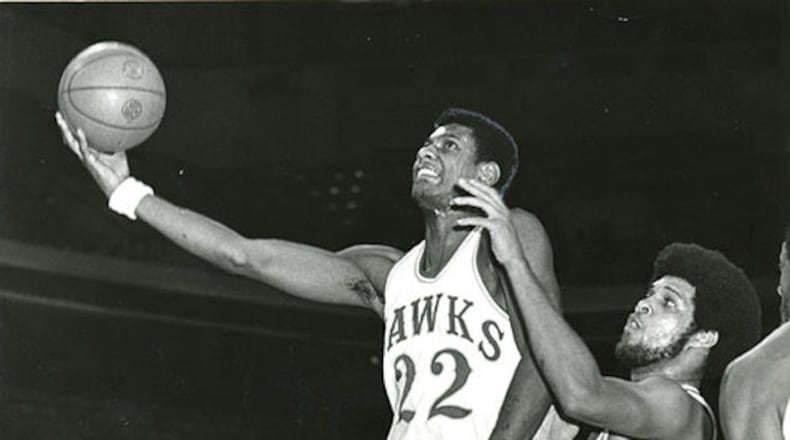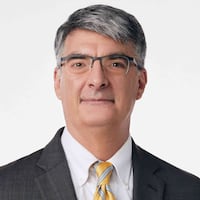John Drew was one of those athletes who should not be forgotten, according to former Hawks teammate Mike “Stinger” Glenn.
Drew, who played for the Hawks for eight seasons and was a two-time NBA All-Star, died at age 67 this week of spinal cancer in Houston. Drew battled drug addiction for much of his 11-year NBA career, one cut short by a ban from the league for violating its drug policy in 1986. He spent his latter years driving a taxi in Houston after he sought the help of John Lucas in recovery. His wife, Brenda, told a Houston television station that Drew had been clean since 2001.
His past should not tarnish his reputation or what he meant to the Hawks, Glenn said.
“His number should have been retired a long time ago,” Glenn, who played with Drew for one season with the Hawks, told The Atlanta Journal-Constitution. “He was one of those kind of athletes that represent the team, the sport, the franchise. Drew was the one who everyone related to. Nice-looking guy, great scorer, charisma, everybody loved him. He didn’t just play two or three years for the Hawks. He played eight years. He carried the organization for years. I thought he should have been respected that way.”
Drew often referred to himself in the third person as “deuces” for his uniform No. 22. The 6-foot-6 small forward was confident in his ability. And he often let his teammates and opponents know it. Glenn related a conversation between Eddie Johnson and Drew before a 1982 playoff series with the 76ers.
“He was such a fun player to play with,” Glenn said. “He always had jokes. He was supremely confident in himself. He talked about himself in the third person, those deuces. He would say, ‘They know when they see those deuces coming, they got to earn their money that night. The deuces are coming.’
“You know that Dr. J (Julius Erving) got to be worried about the deuces coming (Drew said). Eddie told him, ‘Man, when you are the best at your position in the league, you aren’t worried about nobody. Dr. J ain’t worried about John Drew.’ He said, ‘He better worry about them deuces. Those deuces are going to be something on him.’”
History will note that the 76ers swept the series in two games.
Drew was one of the dominant high school basketball players in Alabama state history. He played two collegiate seasons at Gardner-Webb. He was drafted by the Hawks with the 25th overall pick (second round) in 1974. He was named to the All-Rookie team following the 1974-75 season.
Drew played eight seasons for the Hawks, making the All-Star team in 1975-76 and 1979-80. With the Hawks, he averaged 21.2 points and 7.5 rebounds. He was traded, along with Freeman Williams and cash, to the Jazz for Dominique Wilkins in 1982. Drew spent three seasons with the Jazz before his suspension. For his career, Drew averaged 20.7 points and 6.9 rebounds. He had four seasons in which he was among the top 20 in the league in scoring.
“He was the signature of the Atlanta Hawks. He was a very important person for the Atlanta Hawks for those years he carried them. I wanted him to know how much he meant to Atlanta. How much he meant to the organization and to the NBA."
Glenn said he and Drew became fast friends and sought out their favorite restaurant, Benihana, in opposing cities to eat dinner. Glenn said Drew was frank about his struggles and implored his friend to stay away from drugs.
“Don’t ever try any of those drugs. You can’t handle them. I thought I could handle them,” Glenn related of conversations between the two.
Glenn said he tried to bring Drew back to Atlanta several years ago to be recognized for his accomplishments with the Hawks. The visit did not work out. Glenn kept in touch with Drew over the years but had not seen him since the pandemic.
“He was the signature of the Atlanta Hawks,” Glenn said. “He was a very important person for the Atlanta Hawks for those years he carried them. I wanted him to know how much he meant to Atlanta. How much he meant to the organization and to the NBA. He should never feel that he did not do what he should have done regardless of what happened to him. He was a very positive influence.
“I think about with different investors in a team, sometimes they don’t know the tradition, the history, the importance, the significance of the athletes that were before them. They toss them aside. I really like for organizations to recognize and respect the ones that brought the organization to where it is now. I thought he, as much as any player, playing that long, that well, he deserved that kind of respect.”
About the Author
Keep Reading
The Latest
Featured


